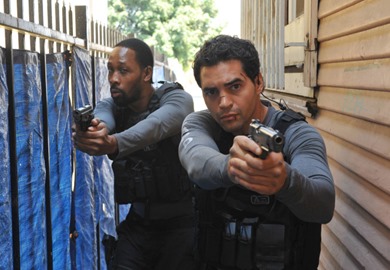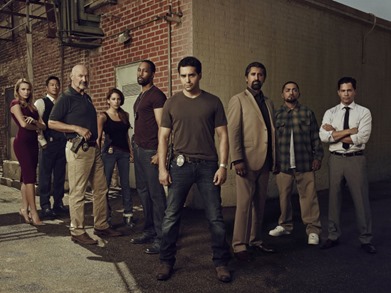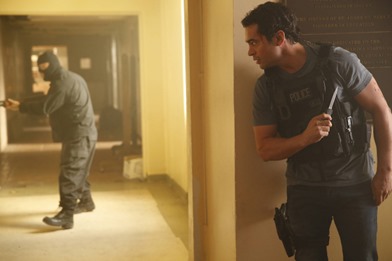In the new Fox series Gang Related (Thursdays, 9/8C) Ramon Rodriguez stars as Ryan Lopez, a gang mole in the LAPD’s Gang Task force, whose life depends on being different things to different people – while facing a crisis of character about his job, his motivations and life. RZA plays his new partner, Cassius Green.
The two take some time to talk about their characters with a group of bloggers journalists provided some very thoughtful analysis in a short but sweet session.
Good morning, guys. Thanks so much for doing this. For Ramon, you are playing Ryan Logan, and he is a guy who kind of has to be a lot of different things to different people while also dealing with—I guess you could call it an identity crisis in his personal life. In terms of the show, he has to—his ability to act actually is what’s keeping him alive. How did you approach the role, and how was the character developed?
Ramon Rodriguez: So first off, his name is Ryan Lopez. I know you said Logan, but it’s Lopez. The research for the character I had about six weeks where I got to spend time with the LAPD, which was very helpful, doing ride-alongs, surveillance, weapons training, and then also they would also introduce me to former and active gang members in different neighborhoods in South Central, Watts, and the Newton division.
So I was kind of splitting my division between LAPD and then speaking to active and former gang members. I also got to go to a prison and speak to some inmates in there to get their perspective on everything—on gang life, growing up, and also how organized it is. So that was kind of the research process of that and doing some stuff online and things like that.
The character was developed by Chris Morgan, who wrote the pilot and created the show. Apparently he was in San Francisco, and he found out that this actually happened, that there are cops who are actually—or have been found out that are active gang members or were former gang members. I also asked guys when I was doing my research in the LAPD, and they said this unfortunately is a reality and it does happen.
You’ve got gangs that send some of their members to the military to learn tactics and strategy and then sometimes even into law enforcement, and they’re informants. So I just approached him as a good guy, and we had a very kind of clear back story for why he’s doing what he’s doing. He’s kind of just a complex guy who’s having to protect himself and survive but also protect his family, and so he’s always putting up several walls to different people. So there’s just a psychology behind that. I got to explore that little bit.
Thank you. RZA, how did you become involved in the project?
RZA: I got involved as the character Cassius Green. Actually, Allen Hughes, the director of the pilot, he had reached out to me after my agent sent the material. I read it. Of course, I was really blown away by the writing of Chris Morgan and Scott and what they had in mind for the show. It felt more like a feature film but I wasn’t sure about going and jumping into the TV world.
But Allen Hughes, the director himself, also reached out to me. We had dinner, and he described to me what he thought the character was and what it would be and what it would mean for me to play this character, and he was willing to adjust the character a little bit as far as his background, bring him from Harlem, New York instead of him being a guy that grew up on the streets of L.A. as he was originally written.
I said okay, it seems like something I—it felt cool. I know Allen. I trusted his creative ability. I trusted Chris and them guys. I met Chris at various times on other projects, and I trusted their creative ability of what they were going to try to bring to the series. And when you do something like this, I thought it was going to be a pilot.
You never know if it’s going to get picked up or not, so you come on board and you give your best energy toward the pilot, and I guess the network saw it and they thought they put a good team together, and we would want to do a season of it. So that was my attraction to it, and I’m really happy to be on board with it.
I was wondering if there’s anything about these characters that you added that wasn’t originally scripted for you?
Ramon: For Ryan there was a ton of back story that—there was some stuff that Chris kind of had a general idea of what he wanted for the story and for Ryan, and then I think as we sat down with Scott—I sat down with Scott and Chris, and we just started discussing characters’ journeys. And a lot of the stuff, specifically with Ryan, deals a lot with Javier.
So he is who he is today as we meet him in the pilot because of his past relationship and what Javier did for him—so basically saving this young kid, taking him off the streets, raising him, loving him, treating him like a son—essentially forms a very deep bond between Ryan and Javier where Ryan feels indebted to this guy and would do anything for him, especially when Javier kind of comes up with some really honorable reasons of why we’re doing what we’re doing. So I think for Ryan in his head it feels justified and right.
So we kind of worked out a lot of the back story stuff. That was a lot of the stuff. The pilot was written. That was set in stone. It changed a little bit. The location changed, but primarily a lot of the stuff we got to work on was back story, his relationship with Javier. We felt like that was a very—it was important to set that foundation in stone so that we know where he comes from and why he’s doing what he’s doing.
Then that also affected Javier, and Cliff had some great thoughts on his character as to what makes Javier and their relationship bond so tightly. And then we talked about the journey throughout the season, but that was kind of an ongoing process.
RZA: And for me, I think what I brought to Cassius was the New York element. They wrote him originally, like I said, as a guy from California, but then they were just able to readjust him to be a guy from Harlem. So that is a territory I know.
But when they asked me, for instance, what kind of car would he drive, and I thought about what would a New York guy do if you came to California. Most likely he would want to kind of blend into the California culture, watching videos young and getting a classic muscle car that the California guys drive and all that. So I started coming from this New York total persona.
To me, I feel like Cassius is a guy who wanted—who wants to be a part of the California scene, like it was more like a fulfilling of a dream for him, a job that gave him a chance to leave New York and to come and have a whole new experience in life, and he chose to get a ‘69 Roadrunner rather than a modern car, because he has his California fantasy in his head.
But I think what I wanted—they told me that the guy was smart, and he had spent years as a DEA officer, and so I want to make sure that he had something studious about him, so I think the glasses was something that I wanted to put on the character. I said, “Let me wear glasses while I’m in the office at least sometimes.” Sometimes I’ll wear them while I’m doing tactics, but mostly inside the office and throughout the series you’ll see him put his glasses on.
I think he’s a smart guy that after he went to school and college and everything and chose to be a law enforcement officer. He chose to be different from his neighborhood. So I think some of that element is what I’m trying to bring out of him, and some of it was written, and some of it was me thinking like what would make him a little different being that he’s not from California.
My first question is for RZA. You’ve worked with an eclectic list of directors such as Jim Jarmusch and Ridley Scott, and of course you’ve directed yourself, so you have a bit of background of how the process works. What actually brought you to this project? What attracted you to it specifically, to Gang Related, because it’s a television program which is a different format than films? So I was just kind of curious what brought you to this?
RZA: It was mostly the writing. Like I said, when I read this—I’m going to save a screenplay even though it was a teleplay—when I read it, it just read like a movie. And wanting to challenge myself as an actor—I played a cop in a movie called American Gangster and I liked the energy that it brought to me. For me from my neighborhood it’s a little ironic that I get to play the good guy, and I wanted to take that challenge.
Now, TV is of course something very different from my past work, and it’s something that demands a certain kind of schedule and a certain kind of commitment, and I think that when I got on board—of course, you’re never sure—as a pilot you’re never sure what’s going to happen. But once the green light was given and we had to engage, I went on there as a puppet.
And every week the difference between a film and TV is that you get a new director almost every week, and so you really got to readjust every week, and there’ve been times when I felt a little out of place in a sense. So the director hasn’t been there for six weeks, so he doesn’t know what the characters like we know the characters. But when you take on a job like this and it’s a commitment to a network, you’ve got to—a part of you got to become puppeteered, and I’m willing to be a puppet in somebody’s hands.
Okay, cool. I appreciate that, man. I’m going to see you performing in Houston at Free Press at the end of the month. I’m real excited to cover that event.
RZA: I’ll be holding my blank on stage and that one. That’s a whole different guy.
Alright, man. Well, I’m excited for that one. Take care. I have a follow-up for Ramon if that’s alright?
Ramon: Yes.
Alright, Ramon, I was drawn to the line in my press kit “every villain has a noble cause, and every hero has a dark side.” This shade of gray is an element that I’ve found to be lacking in pretty much every other police drama that I’ve seen on television right now. What themes such as this are you most excited for the audience to experience?
Ramon: What scenes?
Yes, what scenes. Excuse me.
Ramon: I mean, I think there’s a lot. I think it’s really well written, and there are a lot of really great directors that came in and did some really fantastic work, and so there are a lot of great moments. I mean, what’s really interesting is that I think every character is very dynamic and complex. Like you said, it’s not black and white. So each character as you learn and kind of discover about them, they’ve got stuff going on.
They’ve got kind of rich back stories and rich lives, and then the other thing I—probably not a scene, but I would say what I think people are really going to—what I’m excited for people to experience is kind of the turn of events and characters’ journeys. So I think there are some characters on the show that really have some fantastic journeys, and I’m not going to spoiler alert them.
But there are some great journeys where you think you know someone, you think you know who they are and how they’ll behave, and something is going to affect them. Something is going to change them. And that’s another thing, an aspect that I love about the show is things that happen often are going to have an effect later on. It could be a small thing. A seed will be planted early on, but everything has a bit of a ripple effect, which I love because to me that’s a very kind of universal theme where in life it could be karmic, where you do something and something—you know, there’ll be a reaction.
Every action has a reaction, and that happens in the show a lot where things will happen, and then it might come back later on, and you’ll go, “Oh wow. I remember when that originally happened it didn’t make sense, but now it does.” That, to me, kind of takes very intelligent writing. These writers have really thought out the whole season, and they did callbacks to things, which I always find really captivating and interesting when I watch TV—where I’m like they’re smarter than me. They thought this out, and I love that.
My question is for both of you. I just wanted to know is there anything that you had to do specifically to get into the role to adapt to the character that you’re playing?
RZA: I’ll jump first on this one. Coming up from a guy that for me being blank known to be the villain of the world, so I did take time to spend time with police officers. I have some friends that are in law enforcement that I invited out to my California house and spent the blank with me, and we would talk about police stories and situations. I tried to absorb some of their life and personal lives into my life, which will make me become who Cassius is.
I think one for me also is I play a character who becomes partners with Ryan Lopez, and he doesn’t know Lopez as well as some of the other people. He wasn’t his ride-along guy. And I think that during the process of—during this show that Cassius gets to know Ryan in the same way that as me, myself, have to get to know Ramon. I’ve seen his work, and I knew of him, but we’re not friends that came together. We became—I would like to say we became friends working on his job. I hope he’s my friend now.
Ramon: Yeah, man. Come on.
RZA: Right. I actually love the process that we went through growing not only on-screen but also growing as two guys, and I think some of that as the season goes on it spills over, and you feel it, and I think that was something that was very important, and I think we allowed—I know I allowed. I think it’s something we allowed to bring to the table.
Ramon: Yes, and like I said before, I definitely spent some time with the LAPD. I spent some time speaking to former and active gang members, whether it was through the LAPD sources or through some direct contacts that I had with people, and then I did—I did some reading. There’s a great book that I read called The Black Hand by—I believe it’s Chris Blatchford. He wrote a cool book about the Mexican Mafia and about this guy specifically, “Boxer” Enriquez. It was kind of like his story.
And it was fascinating because he’s a guy who was a made guy in the Mexican Mafia and how he kind of flipped to the feds and gave information. So anyway, there was a lot of reading and also just eventually, like RZA was saying, just the chemistry stuff and once we all got to meet each other and hang out a little bit and we did some weapons training together to develop those relationships. But a lot of stuff was handled prior. I did a ton of research early on before we ever stepped on set, which is always my favorite part of the process.
Photos by Greg Gayne and Justin Stephens/Courtesy of Fox


